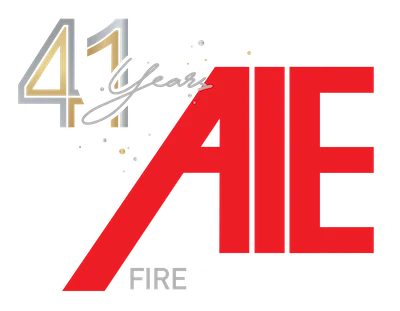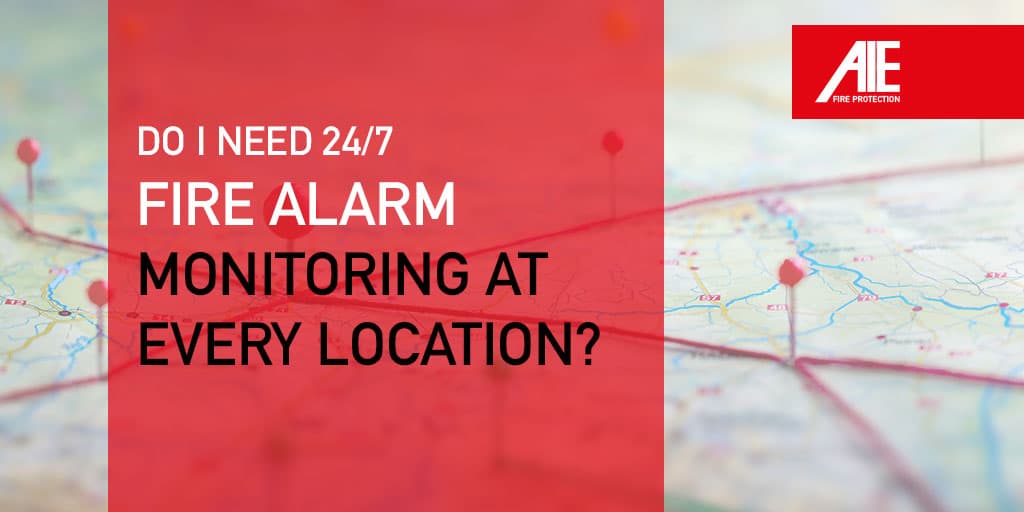When it comes to comprehensive fire protection for your business, 24/7 commercial fire alarm monitoring services provide reliable protection when no one is at your business. They are also part of the overall code requirements at most occupied locations. It is important to know which monitoring systems are necessary, and which monitoring requirements apply to your type of business.
Round-the-clock fire monitoring services ensure 24/7 fire protection. First responders are notified immediately and arrive fast, saving lives and potentially many thousands of dollars in property damage.
According to a ten-year Federal Emergency Management Administration (FEMA) U.S. Fire Administration trend summary (2009-2018), there was an overall 26% increase in nonresidential fires but a 6% decrease in dollars lost.
Why You Need 24/7 Fire Alarm Monitoring Services in Addition to Other Fire Protection
At AIE, we are often asked why commercial fire alarm monitoring systems are so important, especially when fire sprinklers, extinguishers, and other life safety systems are in place. The simple answer is that dependable, 24/7 fire protection and fire alarm monitoring services cut down on firefighter notification time and speeds up their arrival, saving property and lives.
When a fire alarm goes off in your restaurant, hotel, school, retail store, or office building, a monitoring device assesses the signal to rule out a false alarm and instantly transmits the emergency to first responders. The fire department can be on its way often before a person can call 911 or physically get help, especially when trapped by fire. This is why 24/7 monitoring is so important.

Which Buildings Have Fire Alarm Monitoring Requirements?
Fire alarm monitoring requirements can vary from state to state. This is a question best answered by either a professional fire-protection company, your local Authority Having Jurisdiction (AHJ), and/or the 2018 edition of the NFPA 101 Life Safety Code®. You can also find many of the fire codes and monitoring requirements on the NFPA website.
There are many variations on what is required, where, and when, based on many factors, including the age of your buildings and their NFPA occupancy classifications. Of course, being a commercial fire protection company, AIE feels every occupied building would benefit greatly from monitored fire protection services, regardless of whether it is “required” or not. Be sure to check your NFPA 101 Occupancy Classification to determine whether 24/7 business fire alarm monitoring are required. You can always contact our experienced team to verify.
When is Commercial Alarm Monitoring Required?
If your business falls into any of these Commercial NFPA 101 occupancy classification categories, some form of fire alarm monitoring will most likely be required. The features of your commercial alarm monitoring services and system will be based on your classification and the rules of your AHJ.
NFPA Occupancy Classifications for Alarm Monitoring Requirements
- Apartments
- Assembly facilities (where 50 or more people gather for deliberation, worship, entertainment, eating, drinking, amusement, awaiting transportation).
- Business/offices
- Daycare
- Detention and correctional
- Educational
- Healthcare, hospitals, care homes
- Hotels, lodging, rooming, dormitories
- Industrial and storage
- Retail and mercantile
- Storage and industrial
Features of Commercial Fire Alarm Monitoring Services
- Fire alarm: signal sent if fire or smoke detection device is activated.
- Fire trouble: alert for decreased performance or suggested system maintenance.
- Fire supervisory: alert if any of the fire protection system is disabled and/or needs resetting.
- Low battery: alert sent if the fire alarm panel battery is at less than optimum voltage.
- Power failure: critical alert for power failure; usually means fire monitoring needs backup power to function.
- Sprinkler/tamper monitoring: signal sent if sprinkler system is violated/tampered with.
According to FEMA, 40% of businesses never reopen after a fire; 25% of those that do reopen go out of business within the first year.

Is My Business Compliant with Fire Alarm Monitoring Requirements?
Does every building and/or location of your business that’s in use, be it a restaurant, retail or wholesale store, healthcare facility, school, or manufacturing plant, have code-compliant fire monitoring? Not sure of alarm monitoring requirements?
To find out, contact commercial fire protection services like AIE to perform a thorough inspection of your facilities and your fire protection systems. Our specialists will determine if your fire alarm monitors meet AHJ and NFPA codes. We are well versed in all state and local AHJ rules and have working relationships with nationwide jurisdiction personnel. This helps smooth the transition if you should need an upgrade or a newly designed fire alarm system.
If we discover a need for upgraded fire alarm monitors, AIE engineers can design a system with newer technologies that could lower costs (insurance, licenses, etc.), solve important issues, and meet all codes.
24/7 Fire Protection with Dependable Commercial Fire Alarm Monitoring
Now that you are aware of 24/7 monitoring requirements for fire alarms and how crucial it is to save lives, double check to ensure you have the proper fire protection and take steps to become NFPA compliant.
If you are not sure or discover that you don’t have the commercial fire alarm systems you need, AIE’s nationwide team can help. While we don’t provide fire alarm monitoring services, we can recommend a reliable partner. Contact us to discuss your fire protection system or commercial fire alarm monitoring needs today – our in-house customer care staff is available 24/7, 365. 800-892-9863
Information posted in our blog is merely for educational and informational purposes. While the information has been verified to the best of our abilities, we cannot guarantee its total accuracy, and it should not be considered legally binding advice. This blog is not intended as a substitute for professional advice, and should you decide to act upon the information, you do so at your own risk.


Recent Comments